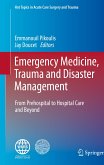This unique and innovative title offers a comprehensive exploration of the intersection of ethics, violence, trauma, and trauma surgery. Underscoring that the causes of violence include a wide range of socioeconomic factors, including poverty and the lack of economic opportunity, and that violence often occurs in impoverished and underserved communities, various authors from a wide range of disciplines outline how intentional violence toward another person is multidimensional and complex. Many of the authors use Chicago as a framework for their chapter discussion, but there are similarities in many urban settings throughout the United States and abroad. Part I of the book, Ethical Issues Related to Violence, includes seven chapters that examine ethical issues related to violence. Each of these chapters discusses a different but intersecting aspect of how violence challenges ethical standards in medicine and health. Part II, Ethical Issues Related to Trauma and Trauma Surgery, offers eight chapters that address various aspects of ethical issues related to trauma and trauma surgery. Part III, Additional Concerns Relating to Violence and Trauma, describe a series of issues relating to violence and trauma, including surgical procedures, psychological distress, and geographic disparities in access to trauma care. Developed by nationally renowned thought leaders in the field, Violence, Trauma, and Trauma Surgery is a major and novel contribution to the clinical literature and will be of great interest to all physicians, clinicians, researchers, social scientists, students, policymakers, hospital administrators and community leaders concerned with understanding and improving outcomes relating to violence, trauma, and trauma surgery.
Dieser Download kann aus rechtlichen Gründen nur mit Rechnungsadresse in A, B, BG, CY, CZ, D, DK, EW, E, FIN, F, GR, HR, H, IRL, I, LT, L, LR, M, NL, PL, P, R, S, SLO, SK ausgeliefert werden.









